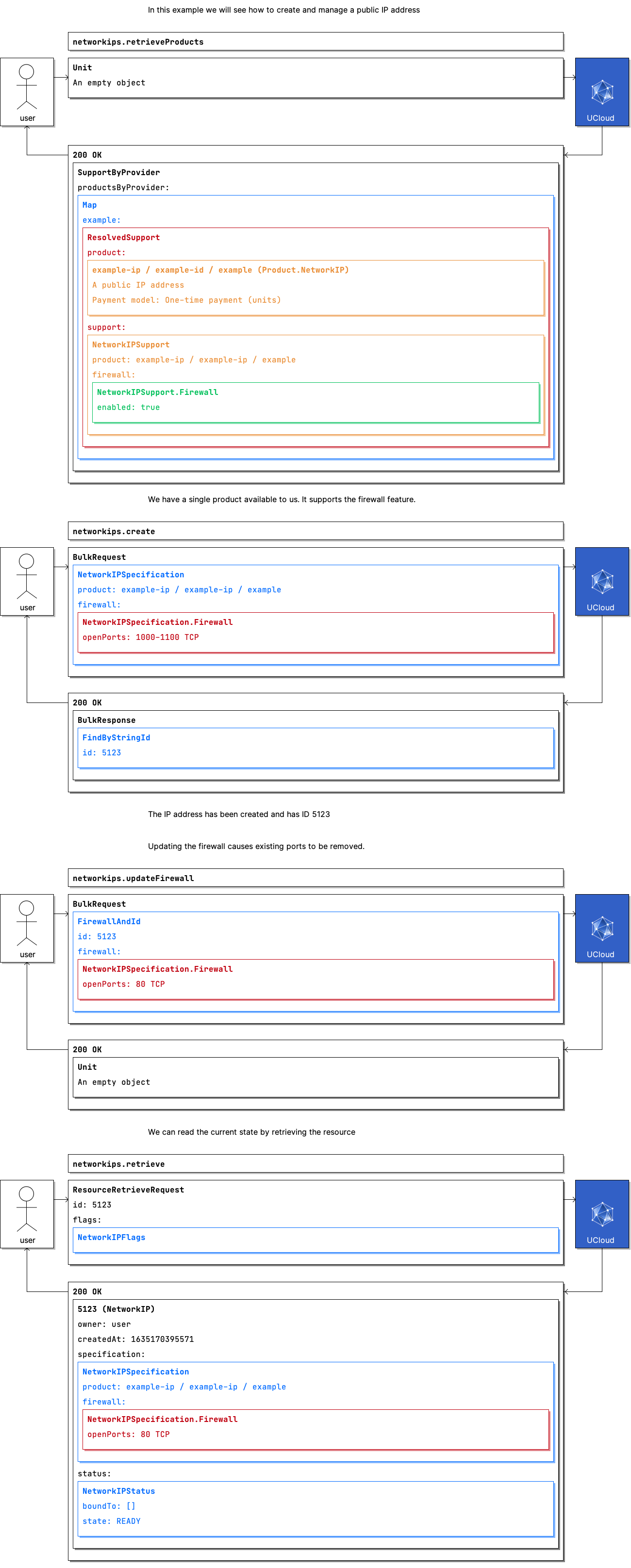Example: Create and configure firewall¶
| Frequency of use | Common |
|---|---|
| Actors |
|
Communication Flow: Kotlin
/* In this example we will see how to create and manage a public IP address */
NetworkIPs.retrieveProducts.call(
Unit,
user
).orThrow()
/*
SupportByProvider(
productsByProvider = mapOf("example" to listOf(ResolvedSupport(
product = Product.NetworkIP(
allowAllocationRequestsFrom = AllocationRequestsGroup.ALL,
category = ProductCategoryId(
id = "example-id",
name = "example-id",
provider = "example",
),
chargeType = ChargeType.ABSOLUTE,
description = "A public IP address",
freeToUse = false,
hiddenInGrantApplications = false,
name = "example-ip",
pricePerUnit = 1,
priority = 0,
productType = ProductType.NETWORK_IP,
unitOfPrice = ProductPriceUnit.PER_UNIT,
version = 1,
balance = null,
id = "example-ip",
maxUsableBalance = null,
),
support = NetworkIPSupport(
firewall = NetworkIPSupport.Firewall(
enabled = true,
),
maintenance = null,
product = ProductReference(
category = "example-ip",
id = "example-ip",
provider = "example",
),
),
))),
)
*/
/* We have a single product available to us. It supports the firewall feature. */
NetworkIPs.create.call(
bulkRequestOf(NetworkIPSpecification(
firewall = NetworkIPSpecification.Firewall(
openPorts = listOf(PortRangeAndProto(
end = 1100,
protocol = IPProtocol.TCP,
start = 1000,
)),
),
product = ProductReference(
category = "example-ip",
id = "example-ip",
provider = "example",
),
)),
user
).orThrow()
/*
BulkResponse(
responses = listOf(FindByStringId(
id = "5123",
)),
)
*/
/* The IP address has been created and has ID 5123 */
/* Updating the firewall causes existing ports to be removed. */
NetworkIPs.updateFirewall.call(
bulkRequestOf(FirewallAndId(
firewall = NetworkIPSpecification.Firewall(
openPorts = listOf(PortRangeAndProto(
end = 80,
protocol = IPProtocol.TCP,
start = 80,
)),
),
id = "5123",
)),
user
).orThrow()
/*
Unit
*/
/* We can read the current state by retrieving the resource */
NetworkIPs.retrieve.call(
ResourceRetrieveRequest(
flags = NetworkIPFlags(
filterCreatedAfter = null,
filterCreatedBefore = null,
filterCreatedBy = null,
filterIds = null,
filterProductCategory = null,
filterProductId = null,
filterProvider = null,
filterProviderIds = null,
filterState = null,
hideProductCategory = null,
hideProductId = null,
hideProvider = null,
includeOthers = false,
includeProduct = false,
includeSupport = false,
includeUpdates = false,
),
id = "5123",
),
user
).orThrow()
/*
NetworkIP(
createdAt = 1635170395571,
id = "5123",
owner = ResourceOwner(
createdBy = "user",
project = null,
),
permissions = null,
resolvedProduct = null,
specification = NetworkIPSpecification(
firewall = NetworkIPSpecification.Firewall(
openPorts = listOf(PortRangeAndProto(
end = 80,
protocol = IPProtocol.TCP,
start = 80,
)),
),
product = ProductReference(
category = "example-ip",
id = "example-ip",
provider = "example",
),
),
status = NetworkIPStatus(
boundTo = emptyList(),
ipAddress = null,
resolvedProduct = null,
resolvedSupport = null,
state = NetworkIPState.READY,
),
updates = emptyList(),
providerGeneratedId = "5123",
)
*/
Communication Flow: Curl
# ------------------------------------------------------------------------------------------------------
# $host is the UCloud instance to contact. Example: 'http://localhost:8080' or 'https://cloud.sdu.dk'
# $accessToken is a valid access-token issued by UCloud
# ------------------------------------------------------------------------------------------------------
# In this example we will see how to create and manage a public IP address
# Authenticated as user
curl -XGET -H "Authorization: Bearer $accessToken" "$host/api/networkips/retrieveProducts"
# {
# "productsByProvider": {
# "example": [
# {
# "product": {
# "balance": null,
# "maxUsableBalance": null,
# "name": "example-ip",
# "pricePerUnit": 1,
# "category": {
# "name": "example-id",
# "provider": "example"
# },
# "description": "A public IP address",
# "priority": 0,
# "version": 1,
# "freeToUse": false,
# "allowAllocationRequestsFrom": "ALL",
# "unitOfPrice": "PER_UNIT",
# "chargeType": "ABSOLUTE",
# "hiddenInGrantApplications": false,
# "productType": "NETWORK_IP"
# },
# "support": {
# "product": {
# "id": "example-ip",
# "category": "example-ip",
# "provider": "example"
# },
# "firewall": {
# "enabled": true
# },
# "maintenance": null
# }
# }
# ]
# }
# }
# We have a single product available to us. It supports the firewall feature.
curl -XPOST -H "Authorization: Bearer $accessToken" -H "Content-Type: content-type: application/json; charset=utf-8" "$host/api/networkips" -d '{
"items": [
{
"product": {
"id": "example-ip",
"category": "example-ip",
"provider": "example"
},
"firewall": {
"openPorts": [
{
"start": 1000,
"end": 1100,
"protocol": "TCP"
}
]
}
}
]
}'
# {
# "responses": [
# {
# "id": "5123"
# }
# ]
# }
# The IP address has been created and has ID 5123
# Updating the firewall causes existing ports to be removed.
curl -XPOST -H "Authorization: Bearer $accessToken" -H "Content-Type: content-type: application/json; charset=utf-8" "$host/api/networkips/firewall" -d '{
"items": [
{
"id": "5123",
"firewall": {
"openPorts": [
{
"start": 80,
"end": 80,
"protocol": "TCP"
}
]
}
}
]
}'
# {
# }
# We can read the current state by retrieving the resource
curl -XGET -H "Authorization: Bearer $accessToken" "$host/api/networkips/retrieve?includeOthers=false&includeUpdates=false&includeSupport=false&includeProduct=false&id=5123"
# {
# "id": "5123",
# "specification": {
# "product": {
# "id": "example-ip",
# "category": "example-ip",
# "provider": "example"
# },
# "firewall": {
# "openPorts": [
# {
# "start": 80,
# "end": 80,
# "protocol": "TCP"
# }
# ]
# }
# },
# "owner": {
# "createdBy": "user",
# "project": null
# },
# "createdAt": 1635170395571,
# "status": {
# "state": "READY",
# "boundTo": [
# ],
# "ipAddress": null,
# "resolvedSupport": null,
# "resolvedProduct": null
# },
# "updates": [
# ],
# "resolvedProduct": null,
# "permissions": null
# }
Communication Flow: Visual
